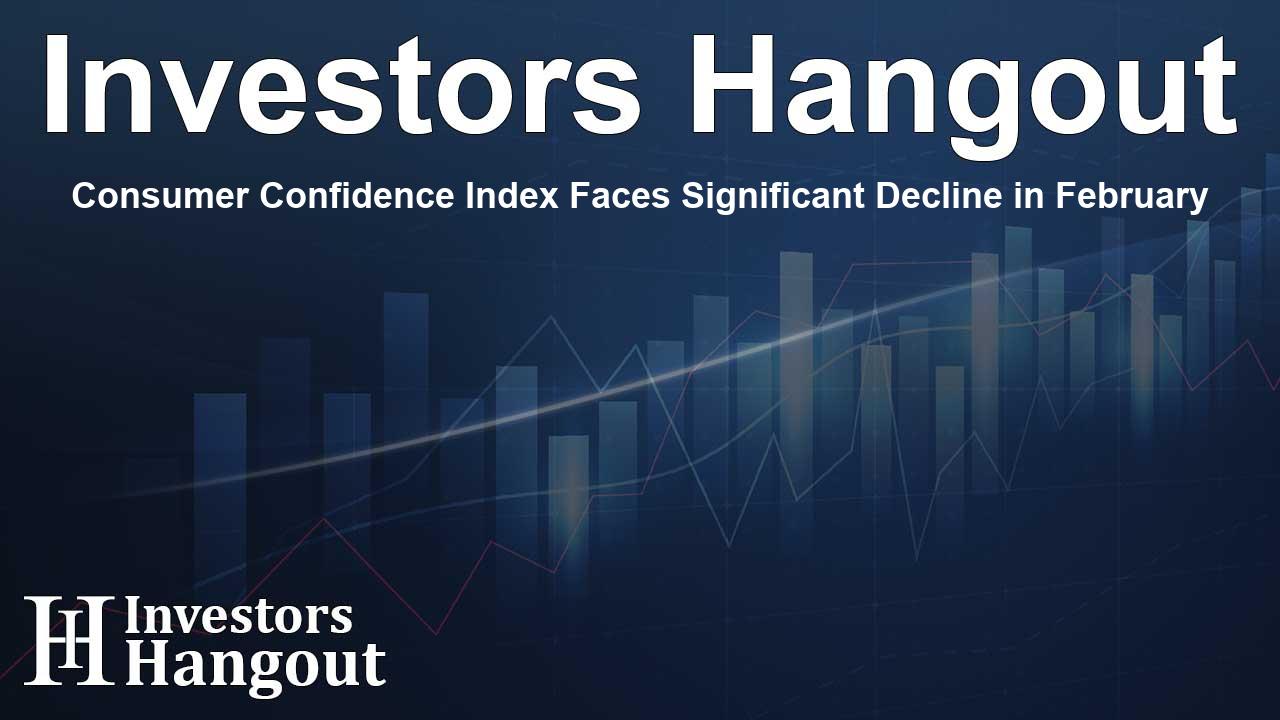Consumer Confidence Index Faces Significant Decline in February

Consumer Confidence Index Faces Significant Decline
The Conference Board Consumer Confidence Index experienced a sharp decline in February, falling by 7.0 points to 98.3. This drop signifies the steepest decrease since August 2021 and marks the third consecutive monthly decline. As a result, the index now sits at the lower end of its two-year range.
Understanding the Consumer Confidence Index
The Conference Board Consumer Confidence Index is an important economic indicator that tracks consumer sentiment about the current and anticipated state of the economy. Conducted through a monthly survey that includes responses from 5,000 households, the index assesses perceptions about business conditions, job markets, and personal financial situations.
Impact of the Decline on Economic Spending
When the Consumer Confidence Index drops, as seen in February, it often indicates a potential reduction in consumer spending. This decline can heighten concerns regarding economic conditions, which in turn might affect business decisions and market trends. A decreasing index can resonate through various sectors of the economy, prompting businesses to reassess their strategies.
Drivers Behind the Decline
The Present Situation Index, which reflects current business and labor market conditions, fell to 136.5. In contrast, the Expectations Index saw a significant drop, plummeting to 72.9—falling below the critical threshold of 80 that often signals a recession. This shift indicates that consumers' confidence in future economic conditions has weakened considerably.
Demographics Affected by the Decline
Consumer confidence has been impacted across all age groups, with the most considerable drops observed among individuals aged 35 to 55. Expectations regarding future income, business conditions, and job prospects declined sharply, signaling increased pessimism within this demographic.
Inflation and Market Expectations
Inflation expectations significantly surged to 6%, primarily driven by price hikes in essential goods, such as eggs, as well as ongoing concerns related to tariffs. Furthermore, recession expectations have risen to a nine-month high, while stock market optimism has declined, with only 46.8% anticipating gains, down from 54.2% in the previous month. Alongside this, over fifty percent of consumers expect interest rates to rise in the near future.
Insights from Economists
Chief Economist Jeffrey Roach from LPL Financial highlighted that while current economic conditions remain relatively positive, the outlook for the future has deteriorated for the third consecutive month. He noted that consumers are growing more concerned about tariffs and escalating prices, although there are indications that more individuals are planning to purchase homes in expectation of lower mortgage rates.
The Labor Market’s Role
Roach commented on the current labor market, indicating that consumers are perceiving job availability as decreasing. While these shifts in consumer sentiment are noteworthy, he cautioned that the volatility of consumer confidence surveys is unlikely to have immediate effects on the Federal Reserve’s monetary policy decisions.
Conclusion
As the Consumer Confidence Index reflects significant shifts in consumer sentiment, businesses and policymakers will need to keep a close eye on these trends. Understanding the underlying factors contributing to these sentiment changes will be crucial for adapting to a potentially challenging economic landscape ahead.
Frequently Asked Questions
What is the Consumer Confidence Index?
The Consumer Confidence Index measures consumers' sentiment regarding current and future economic conditions, influencing consumer behavior and spending.
Why did the Consumer Confidence Index decline in February?
The index fell due to rising inflation expectations, concerns about the job market, and pessimism regarding future business conditions.
How does consumer confidence impact the economy?
A decline in consumer confidence can lead to reduced consumer spending, which may slow economic growth and affect business strategies.
Which demographics were most affected by the decline?
The most significant decline in confidence was noted among consumers aged 35 to 55, reflecting increased pessimism about job prospects and income.
What are the implications of rising inflation expectations?
Rising inflation expectations can signal potential challenges for consumers and businesses, impacting spending habits and interest rate forecasts.
About The Author
Contact Caleb Price privately here. Or send an email with ATTN: Caleb Price as the subject to contact@investorshangout.com.
About Investors Hangout
Investors Hangout is a leading online stock forum for financial discussion and learning, offering a wide range of free tools and resources. It draws in traders of all levels, who exchange market knowledge, investigate trading tactics, and keep an eye on industry developments in real time. Featuring financial articles, stock message boards, quotes, charts, company profiles, and live news updates. Through cooperative learning and a wealth of informational resources, it helps users from novices creating their first portfolios to experts honing their techniques. Join Investors Hangout today: https://investorshangout.com/
The content of this article is based on factual, publicly available information and does not represent legal, financial, or investment advice. Investors Hangout does not offer financial advice, and the author is not a licensed financial advisor. Consult a qualified advisor before making any financial or investment decisions based on this article. This article should not be considered advice to purchase, sell, or hold any securities or other investments. If any of the material provided here is inaccurate, please contact us for corrections.
